- Home
- Roger Smith
Wake Up Dead: A Thriller (Cape Town Thrillers) Page 2
Wake Up Dead: A Thriller (Cape Town Thrillers) Read online
Page 2
“Jesus, can’t you cover him at least?” Dick Richardson, Joe’s lawyer, stood at Roxy’s side by the freezer drawer.
The morgue attendant, a young brown man in a stained white coat, shrugged.
“And why the hell aren’t we in a viewing room?” asked Dick.
“Viewing rooms is full.”
Roxy was still numb after the events of the night, and anyway, she’d seen Joe looking worse. The attendant watched her like she was edible, waiting for her to speak.
“Yes. This is my husband.”
He made a note on a clipboard and shoved the drawer closed.
“Hell of a business,” Dick said as he took her arm and led her away. “This bloody city is out of control.”
He held open a door the color of clotted cream and let her walk out into the corridor.
A bedlam of bodies on gurneys, cops, harried morgue officials trying to deal with the deluge of the dead and the grieving families they had left behind. Industrial-strength disinfectant fought a losing battle against the sweet smell of human flesh gone bad.
Dick moved in to take her arm again, but she edged away from him. He had graying sandy hair, and yachtsman’s wrinkles fanned out from his pale eyes. Cultivated a passing resemblance to a younger Robert Redford.
“Sorry you had to go through this. I asked the police if I couldn’t do it, but they insisted you identify Joe.”
“It’s okay.”
They stopped at an office, where Roxy had to sign for Joe’s personal effects. An asthmatic woman with faded yellow skin wheezed as she dumped a bulging plastic bag onto the counter. The woman removed each item for Roxy to identify. Joe’s shoes, socks, underwear, suit pants, belt, and bloodstained white shirt. His wallet was there, with his driver’s license and credit cards, but the wad of cash she’d glimpsed the night before when he’d paid for the meal was missing. As were his wedding band, cell phone, and the Patek Philippe watch she’d bought him for his last birthday.
Bought with his money, but still.
Roxy didn’t bother to query the missing items. If the living were targets in this city, then why not the dead? She signed the form, and the woman sucked on an inhaler and crammed the clothes back into the bag. Roxy took the bag and followed Dick out into the corridor.
“There were things missing, weren’t there?” he asked.
She shrugged. “I don’t care.”
“In this place you’re lucky if they only steal your phone or your money. Last week they sawed the foot off some poor bastard who died in a car accident.” This got her attention. “Probably sold it for muti.” Coming out as moo-tee in his nasal accent. “Witchcraft, you know? Bloody savages.”
He held another door open, and they were out in the brightness of the Cape Town morning, the hard African sun showing all the blemishes of the Salt River morgue and the shabby buildings around it, out on the fringes of the city.
Roxy slipped on her sunglasses. As they walked toward Dick’s Range Rover his cell phone warbled, and he mouthed an apology and took the call. Roxy stood and looked up at Table Mountain, looming above the squalid buildings, a soft white cloud boiling over the flat top like spume as the wind drove in from the south.
It was still early, just gone eight in the morning. She hadn’t slept the night before, lay on the bed in the spare room—unable to face the bedroom that still smelled of Joe—staring out into the dark, until the sun touched the rocky face of Lion’s Head. Lying awake when Dick called her at seven, told her the police wanted her to formally identify Joe so they could start the autopsy. Dig the bullets out of him.
Roxy walked over to a trash can on the sidewalk. Junk overflowed onto the pavement, so she set the plastic bag on top of the mound of garbage beside the can. A homeless couple lurched out of a nearby doorway and hurried toward the trash, leaning like sailors on a storm-swept deck. She turned back to the car. Dick was still talking into his phone, his free hand patting down the sandy hair that lifted in the wind.
Roxy heard shouting and looked back. The couple fought over the bag. The man tore Joe’s shirt out of the woman’s hands and unballed it, holding it up against his chest, the cloth flapping like a bloody flag of defeat.
Roxy saw Joe’s body surrounded by cops and emergency teams, flashing lights washing the road red and blue. And she saw herself, wrapped in a paramedic’s blanket, telling her story. There had been two men. No, she never really got a look at them. It had all happened too fast. One of them shot Joe twice, and they fled into the night in the Mercedes.
Carefully editing out how, after she had fired that shot, she had thrown the gun over the cliff, into the scrub far below. Manufacturing widow’s tears as she watched the paramedics sliding Joe’s body into the morgue van like they were taking out the trash.
She was still shocked at how easy it had been, how light the gun had felt in her hands, how the recoil had flowed effortlessly up her arms and into her shoulders. How the lies had flowed from her tongue.
chapter 3
FIRST THEY MADE HIM DIG HIS OWN GRAVE.
Because they were young—at sixteen Piper was the oldest, and Goose with the withered arm was just twelve—they were impatient and the grave was shallow. Then they beat him to the ground with their fists, kicked him as he folded himself into a ball in a vain attempt to protect himself. Piper kneeled over him and applied the blade, even at that age expert at understanding the difference between wounding and killing.
The honor of pouring the gasoline fell to the feebleminded Elvis, who giggled and showed his missing front teeth as he doused their victim. Piper lit a cloth and threw it. They all stepped back and watched the flames leap, laughing as he screamed and writhed.
After a minute they rolled his burning body into the grave.
Two of them, black against the bleached sky, worked the shovels, the other three pushed at the sandy soil of the Cape Flats with their hands and feet. The earth pressed down onto his limbs, filled his mouth and his nose, and covered his eyes until he saw nothing but blackness.
Billy Afrika fought himself up through the dark.
Found himself in bed at the backpackers’ hotel, light slicing through the shuttered windows.
Drenched in sweat, he pulled on a T-shirt and jeans to cover the scar tissue that patterned his legs and torso like the hide of a piebald horse, and went out onto the wide balcony that ran the length of the building. Eyes squinting against the sun, he drank air and gripped the railing, his fingers locked around Victorian wrought-iron filigree.
It was years since he’d had that dream.
He’d slept much later than he intended, and traffic snarled beneath him. The backpacker on Long Street, the low-rent tourist district of downtown Cape Town, was cheap, anonymous, and noisy. Beer bottles and dirty ashtrays littered the plastic table beside him. Jet-lagged, he’d battled to fall asleep the night before, kept awake by the mating calls of French and German kids, drinking and smoking weed with hard-eyed local girls the color of toffee. A watering hole on an African sex safari.
Calmer, Billy went back into the room, stripped to his briefs, and lowered himself to the wooden floor. After a hundred push-ups he felt a different kind of sweat dripping from his body. He pushed on, muscles warm and fluid.
Two hundred.
Lifting onto his fingertips.
Three hundred.
Sweat plopping to the wood beneath his eyes. Without breaking his rhythm he put his left hand behind his back, flattened his right palm to the floor and continued one-armed.
Three fifty.
Swapped in midair, right hand behind his back.
Four hundred.
Rolled himself up to a sitting position, feet hooked under the frame of the bed, fingers laced behind his neck. Five hundred sit-ups. Fast. His scarred body a blur of muscle and sweat.
Then he lay back on the floor, staring up at the pressed metal ceiling high above him, letting the sweat cool, drawing air into his lungs through his nose. The terror had drained from his body.
As he felt his pulse rate slow, he carefully packed away the fragments of his past.
THEY WERE IN Dick’s Range Rover, stuck in the morning traffic between Woodstock and downtown. Roxy had opened her window, not minding that the hot wind blew her hair into her eyes. Dick reeked of the aftershave a TV commercial told him would make him irresistible. It had lied.
He maneuvered into a gap in the traffic, searching for words to fill the silence. “Jesus, I still can’t get my head around this. Can’t believe Joe’s gone. He was one of a kind.”
“Yes, he was,” she said.
No, he wasn’t, she thought. He was like most of the men she’d been with since she was a teenager. Like the man sitting next to her, looking at her as if she was a beautiful accessory, a floating trophy ready to move from one rich man’s bed to the next. The way she’d allowed them to look at her. The way she’d looked at herself.
No more.
“How are you for cash, Roxanne?”
“I dunno. Joe took care of that.” Playing dumb. Men like Dick liked dumb.
“Look, all his bank accounts will be frozen until the legalities of the estate have been observed. But I was holding some money in trust for him, which, under the circumstances, could be made available to you. About a hundred and fifty thousand rand.”
Around twenty thousand dollars.
“Thanks, Dick. I really appreciate it.”
“No problemo. Give me two days, max.” He beamed, like a golden labrador about to bury his snout in a woman’s crotch. “Now, can I take you to breakfast? The Mount Nelson is fabulous on a day like this.”
His insensitivity almost made Roxy laugh. “Some other time, okay?”
“Sure.” Hiding his disappointment behind a grin. “You need anything, you just shout. Twenty-four seven. Anything at all.”
She stared down at a small car stopped next to them at a light. A child—a girl with wispy blonde hair—was strapped into a car seat in the rear, having an animated conversation with a soft toy. She looked up and saw Roxy and covered her face with her hand, shy, but one eye still peeping. Roxy felt a moment of almost overwhelming sadness, followed by a flash of the same fury that had made her squeeze the trigger and kill her husband.
Then, as the Range Rover surged off into the traffic, leaving the girl behind, it was as if the anger was left behind too, and Roxy had a sudden sense of her own freedom. A soft voice nagged, telling her that things couldn’t be this easy. She should feel something. Guilt. Fear.
But she didn’t. Not yet.
She felt clean. Cleaner than she had in years.
chapter 4
THE CAPE DOCTOR, THE GALE THAT TORE IN OFF THE INDIAN Ocean, blew Billy Afrika back to his past, way out on the Cape Flats. Table Mountain a distant mirage.
Back in the apartheid days of the sixties and seventies, the Afrikaners—ashamed of the mixed-race people who had swum out of a shared gene pool and spoke their language—had dumped them out here. Their labor had been welcomed in the city and suburbs by day, but by night they had to hustle their brown asses back to these windswept ghettos—a grid of cramped houses and airless apartment blocks.
A decade and a half after apartheid ended, things hadn’t changed much.
Billy hadn’t intended coming back here so soon, but Strategic Solutions, Joe Palmer’s recruiting agency, was locked and deserted, mail piling up behind the glass doors in its downtown offices.
He’d put a call in to an ex-colleague, a cop with a weakness for gambling and jailbait, who promised to track down Joe’s home address in exchange for a hundred bucks. Would have the address for him at the end of the day. Time, then, for Billy to go back to the place where those nightmares were born.
Time to return to Paradise.
He drove a rental Hyundai down Main Road, which carved Paradise Park in two. White City, to the left, was the turf of the Americans, who wore the tattoos of the 26 prison gang. Dark City, facing off across Main, was ruled by their enemies, the 28s. Two armies separated by a narrow road and truces fragile as tik smoke.
And when the wind blew the truces away, the yellow sand of Paradise Park ran red with gangbangers’ blood.
Billy passed the open lot where he’d been torched and buried twenty years before. Not vacant anymore. Home to a tik dealer whose rusted trailer drew schoolkids like flies to shit. The trailer squatted in the shadow of a ghetto block as uncared for now as it had been back when Billy lived there as a kid. Only the 26 gang graffiti was fresh.
At sixteen, when he’d left the burn unit—weak and scarred—he’d dragged himself up the piss-fouled stairs, to a squalid apartment where his naked mother had entertained some rubbish with a soul patch and prison tattoos. She lay on the sofa, a bottleneck in her hand, pulling on what they called a barry back then. Barry White. White pipe. Weed mixed with a crushed button of Mandrax.
She hadn’t been near the hospital in the months he’d lain there silently screaming, stinking beneath the salve and the bandages.
His mother had raised herself on one elbow, breasts sallow and heavy, squinting at Billy through the fumes and said, “Where the fuck you been?”
That had been the extent of her sympathy.
Billy’s journey down memory lane was interrupted when a car sped out of Vulture Street—Dark City side—nearly collecting him before it shot off down Main. It was a new BMW 7 Series, sporting extras like fat tires, louvers, mud flaps, and a feature that definitely didn’t come standard: a man tied to the rear bumper by his ankle, bouncing as he was dragged, leaving a strawberry smear on the dusty blacktop.
On the sidewalk a group of schoolkids, in the grip of the munchies after visiting their dealer, bought cotton candy from a one-legged simpleton. The kids pointed at the Beemer. Laughing fit to puke. The simpleton danced on his good limb—empty trouser leg flapping—clapping and whistling through his missing front teeth, enjoying the free entertainment.
Whoever said there’s no place like home had got it one hundred percent fucken right.
Billy was heading in the same direction as the Beemer, but he stayed well back in case the rope snapped and sent the man under the wheels of his car. All along Main Road people seeped out of houses to watch the procession.
The road ran dead into a garbage dump, a huge landfill that sprawled out toward the airport. Two houses backed onto the dump, in no-man’s-land between 26 and 28 turf, staring up Main Road. Not a popular place to live, and one of the houses was derelict. The second house was in better shape but still dilapidated, even by Paradise Park standards.
This was Billy’s destination. And that of the driver of the BMW.
As the Beemer stopped, Billy saw that the man who had been dragged—his clothes bloody shreds, flesh raw and livid where the skin had been scraped off—was moving, lifting a torn arm as if some kind of salvation was within his grasp.
Billy left the Hyundai, hearing Céline Dion belting out “The Power of Love” from inside the BMW. There were three men in the car, which rose on its springs when the driver stepped out.
Shorty Andrews said, “Billy Fucken Afrika.” Head of the Dark City 28s, he stood six-six and weighed around three hundred, bulging out of his T-shirt and striped baggies, arms a canvas of gang tattoos. His voice as high and sweet as a castrato’s.
Billy said, “Shorty,” as he looked down at the man on the road. “Who’s the hamburger?”
“Some fucker lives my side but steals shit over in White City. We got a ceasefire going, Manson and me. And you know fucken Manson, any excuse to start shooting. I got me a wife and kids now. Can’t let a cunt like this start another war.”
Shorty nudged the bleeding man with a giant Nike. The man whimpered. Shorty kicked him hard, then turned to the two men who stood beside him. “Osama, Teeth, go fetch Doc before this fucker dies. I want him walking round still.”
The two men went toward the house and banged on the front door.
Shorty said, “So, when you get back, Barbie?”
Barbie. Nothing to do
with the doll. Barbecue. Cooked meat. Cape Flats humor. The name given to him when he came out of the burn unit. It had been a while since he’d been called that, almost made him feel at home.
“Last night.”
“And how is it over there?”
“A fucken mess. But it’s not my mess, you get me?”
“Ja, I hear you, brother. But they pay a man good?”
“Ja. The Yanks they liked this brown skin. Said I blended in nice with the local inhabitants.”
“Good to know a brown man got some use somewheres.” Shorty laughed.
A blue Ford sped by, braked, threw a noisy U-turn, and slid to a stop, flinging dust at them.
“Where’s the circus?” Shorty said, “’Cause here’s a fucken clown.”
Detective Ernie Maggott left the Ford and walked over to them. A small, coiled spring of a man, jammed inside a check shirt and no-name-brand jeans, a violent eruption of pimples flaring across his putty-colored face and neck.
His eyes flicked over Billy, then he looked down at the bleeding man. “The fuck’s this?”
“What you’d call an internal matter,” Shorty said.
Maggott spat a laugh. He shook a half-smoked Camel out of a pack, hand shielding his mouth from the wind as he lit the cigarette. He exhaled smoke up into Billy’s face.
“Didn’t think you’d come back this side.”
Billy stayed cool. Said nothing.
Shorty’s two men were walking back, followed by Doc, who was on the downhill side of sixty. Flabby, with skin the color of strong tea left to stand. What hair he had left crept across his skull in an uneven fuzz. He had the cautious walk of the permanently drunk.
Doc looked at the bloody man, then up at Billy. “Not even a fucken postcard, Barbie?”
Billy shrugged.
Doc shook his head, sighed. “Shorty, what in God’s name you expect me to do with this?”
Shorty said, “Patch him up, Doc. Get him back on the streets. He gonna be a lesson to the fuckers out there.”

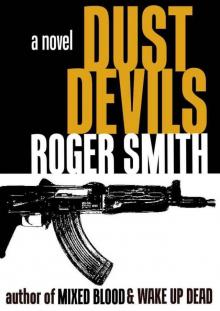 Dust Devils
Dust Devils![[2013] Sacrifices Read online](http://i1.bookreadfree.com/i/03/19/2013_sacrifices_preview.jpg) [2013] Sacrifices
[2013] Sacrifices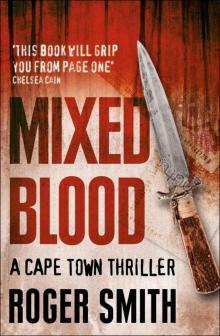 Mixed Blood
Mixed Blood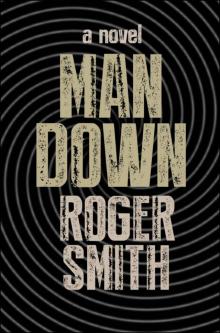 Man Down
Man Down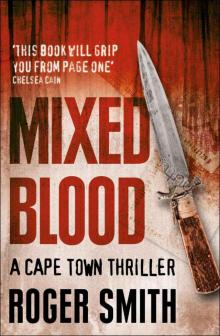 Mixed Blood ct-1
Mixed Blood ct-1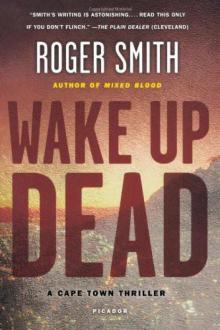 Wake Up Dead: A Thriller (Cape Town Thrillers)
Wake Up Dead: A Thriller (Cape Town Thrillers)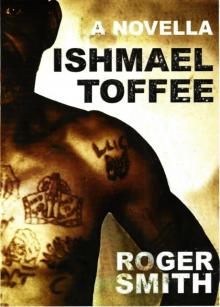 Ishmael Toffee
Ishmael Toffee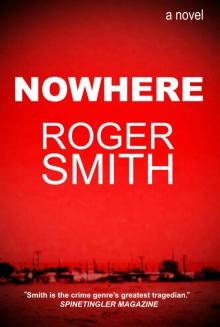 Nowhere
Nowhere Sacrifices
Sacrifices